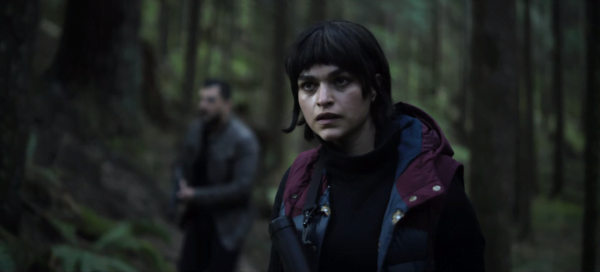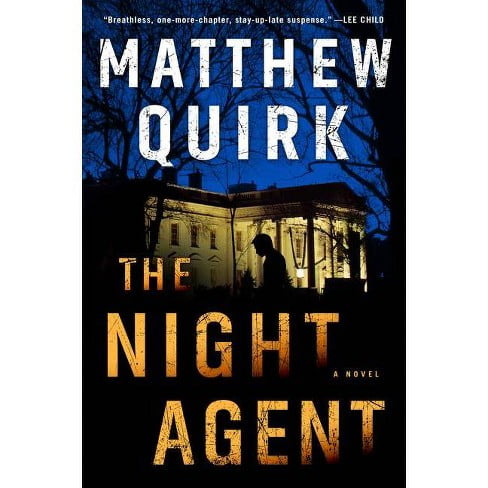When someone said that having a lot of broccoli will not make you appreciate chocolate more, they knew exactly what they were talking about. Mediocrity may make you miss excellence and finesse a tad more strongly, but the feeling of being stumped when something delicious — a TV show or a food item — is offered to you does not need an antithesis. It works miracles all on its own. So, when I watched The Night Agent, Netflix’s new US political thriller based on Matthew Quirk’s 2019-novel of the same name, the dissatisfaction seeped through and made me miss the brilliance of other sagas cut from the same cloth but its frustration lingered all by its own doing.
In this show, supposed to be about the dark underbelly of US political institutions and the fallibility of their notions of national security, we only ever witness complacency and gullibility all at once. The men are brooding, hubristic, and grey, while the women are overconfident and incompetent at once. And the nationalistic fervour — it sticks out like a sore thumb in this predictable mess.
In this show, supposed to be about the dark underbelly of US political institutions and the fallibility of their notions of national security, we only ever witness complacency and gullibility all at once. The men are brooding, hubristic, and grey, while the women are overconfident and incompetent at once. And the nationalistic fervour — it sticks out like a sore thumb in this predictable mess.
The show begins with Peter Sutherland Jr. — an FBI agent — saving a metro full of people from a bombing and it follows the ghosts of his past in the shape of his father’s treason to the country Peter still spends his nights protecting. A cybersecurity startup’s ex-CEO, Rose Larkin, is the trope-necessary damsel in distress Peter must save when he receives a call on the night action line he mans in the Pentagon’s basement. We never really learn how one cybersecurity breach in her company dragged down Rose from TED talks to bankruptcy — and we are never expected to care much, as long as we remember that she is a hacking genius who can crack complex national security firewalls and even restore communication using radio frequencies.
In the midst of this, we also have an assassin couple that steals babies and gets turned on by murder, a Chief of Staff to the President (a breath of fresh air in Hong Chau’s portrayal of Diane Farr) whose allegiances are blurry, a teenage daughter of the Vice President who resents her father, and a mastermind businessman plotting every evil there could be in the world. Possible depth is offered by a glimpse into the lives of Secret Service agents, Chelsea Arrington and recovering addict Erik Monks, who straddle the burden of marginalisation and privilege in their race, gender, and uncertain drive to be heroic.
But any possibility for depth and immersion surrenders to the one-tone narrative of this show — people in the US institutions may be flawed, but the institutions are worth dying for because patriotism trumps everything else. This would have been tolerable had I not marvelled at the realistic nuance of Keri Russell’s The Diplomat, released on Netflix less than a month ago. It shows women sweating and struggling and thinking through their strengths as well as limitations — the way smart and capable women do in all professions — but The Night Agent almost does not respect its women characters.

For instance, Rose has had no training in physical combat, covert ops, or counterintelligence, but she becomes the harbinger of justice within the first couple of episodes after suffering the kind of familial loss and trauma that might keep normal people jittery for a lifetime. This school of tough girl feminism and bold empowerment is built on recklessness and jibes meant to make us marvel at her bravery when she questions Peter on why he assumes he should be the one driving the getaway car.
Let alone the Bechdel test where two women organically talk to each other in pop culture without discussing a man, The Night Agent fails the test for fundamental conversation required to build connection and chemistry on screen. The only heartfelt conversations that feel real and spontaneous take place between Arrington and Monks as part of the protection detail for Maddie, the VP’s daughter. Rose and Peter, the protagonist team, only ever talk for the sake of narrative exposition to be hammered into the audience’s head.
The series offers a momentary sense of reasonable hope when Peter reminds her that he is the only one trained for this, yet all this rationale dies a painful death when we are expected to see her as his partner-in-justice who fights trained assassins and succeeds. The math is never math-ing with this kind of hollow girlboss empowerment.

Let alone the Bechdel test where two women organically talk to each other in pop culture without discussing a man, The Night Agent fails the test for fundamental conversation required to build connection and chemistry on screen. The only heartfelt conversations that feel real and spontaneous take place between Arrington and Monks as part of the protection detail for Maddie, the VP’s daughter. Rose and Peter, the protagonist team, only ever talk for the sake of narrative exposition to be hammered into the audience’s head. It is not surprising that two strangers who are tied together through violent adversity form a trusting bond in a short span of time — we’ll take unlikely companionship any day.

But for us to hear about every bit of their past and traumatic childhood experience in lieu of organic conversations and dialogues about planning ahead — it is a bombing headache of catastrophic proportions. ‘Want to meet up at a discreet spot? Oh, my traitor dad used to take me there fishing. Do you know why I find the library a quiet place? It (ever-so-predictably) was an escape from the noise of my parental discord.’
There is some respite in the performances — particularly that of Hong Chau as Farr, Fola Evans-Akingbola as Arrington, and Gabriel Basso as the titular night agent, Sutherland. Chau emerges as deadpan and difficult to read the way Farr is intended with complex loyalties and messy judgement. We are made to see Peter as respectful of authority and Basso’s earnest demeanour gets this faith across the shore in several scenes, especially the ones where he struggles to articulate what he believes about his father and his alleged treason. It would have elevated this experience to see his relationship with Rose develop in all its genuineness and vulnerability, but the series stops short of mustering any real connection and we have to make do with the yawning assumption that these two belong together just because they are young, single, broken, and beautiful.
It is also refreshing to see something just a little bit defiant of American propaganda – though this is by no means an alternative, let alone an antithesis to the high doses of nationalism injected within our cultural veins through Hollywood, books, and shows. In a debate about US control on foreign political outcomes, the fictional woman President asserts that they have no right to cause upheaval and play puppeteer in the matters of another country.

This intervention, if we may see it as some degree of that, is topical and a poignant reminder of the horrors unwarranted US intervention has unleashed across the globe. Exposing how these horrors are packaged in the alluring garb of national security concerns and altruism, while they are nothing more than power-hungry moves, is a small triumph for the show that should have lasted much longer.
Alas, we’ll always have the bitter aftertaste of this burnt broccoli and a sigh for what could have been only if The Night Agent dared to be real, and in that vein, memorably audacious.




